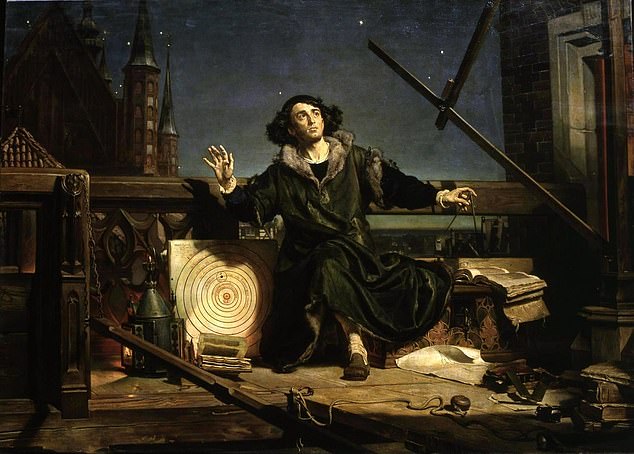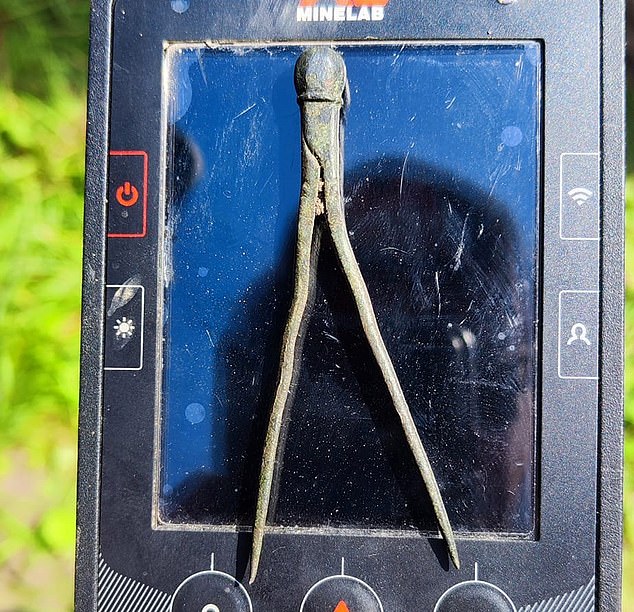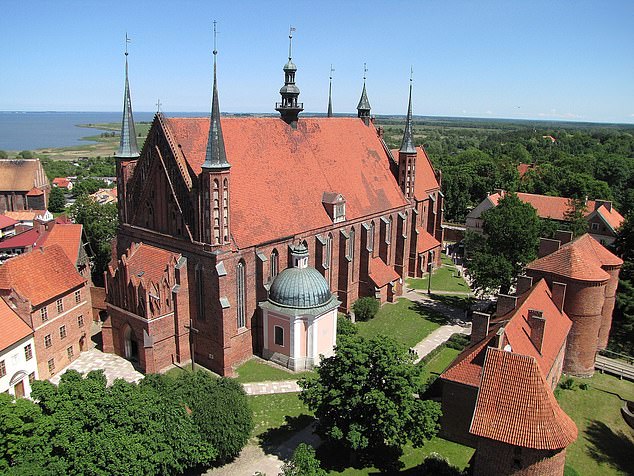Copernicus’ lost compass is FOUND after 500 years: Instrument discovered in a castle in Poland is thought to have belonged to the astronomer who proposed that the planets orbit the Sun
- The compass was found on the grounds of the 14th century Frombork Castle
- It was from there that the astronomer made most of his important discoveries
A 500-year-old compass, thought to have belonged to astronomer Nicolaus Copernicus, has been found in a castle in Poland.
The compass, made of a copper alloy, was found by amateur archaeologists using ground-penetrating radar to comb the grounds of the 14th-century Frombork Castle in the north of the country.
There the astronomer made most of his important discoveries about the heavens and perfected his heliocentric theory, in which the Sun, not the Earth, is the center of the universe.
The compass, known from Jan Matejko’s painting ‘Conservations with God’, was found in a room buried beneath the castle gardens.
A 500-year-old compass believed to have belonged to astronomer Nicolaus Copernicus has been found in a castle in Poland.

The compass, famously depicted in a painting by Jan Matejko’s ‘Conservations with God’, was found in a room buried beneath the castle gardens
The Treasure Mission group that found the compass posted a photo on social media of the compass dangling above the painting, writing: ‘In the garden, where Nicolaus Copernicus conducted his astronomical observations, we found a compass dating back to the early 16th century.
‘This incredible discovery not only takes us back in time to the period when Copernicus made his groundbreaking discoveries, but also opens up new possibilities for understanding his working methods.
‘Thanks to the collaboration with archaeologists, we discovered that this compass could be used for precise measurements, which were crucial for astronomical research.

The Treasure Mission group that found the compass posted a photo of the compass on social media, saying: ‘In the garden, where Nicolaus Copernicus carried out his astronomical observations, we found a compass dating back to the early 16th century’

The compass, made of copper alloy, was found by amateur archaeologists using ground-penetrating radar to comb the grounds of the 14th-century Frombork Castle in the north of the country.
‘Is it possible that this tool was used by Copernicus himself or by his colleagues?’
According to legend, Copernicus used a secret tunnel from his private home to access the city’s cathedral.
There amateur archaeologists discovered the compass.
Zorjana Polenik from the Nicolaus Copernicus Museum in Frombork said: ‘It could well be Nicolaus Copernicus himself.’
Copernicus was forced to flee the castle in the 1520s during the war between Poland and the Teutonic Knights. He later returned to write his influential work, De Revolutionibus Orbium Coelestium.
The groundbreaking work was published late in his life, in March 1543, and elevated him to one of the fathers of modern science.
It was not until many years later, in 1616, that the Catholic Church banned the book because it was contrary to church teaching.
In 2008, DNA testing was done on skeletal bones found under the castle’s foundations, which showed that they belonged to the astronomer.
He is buried in the castle cathedral.
The compass will now be sent to the Monuments Conservator of Poland for testing.
